2020 is undoubtedly the strangest and most twisted year that I have lived through. Granted, I am 21 years old, but it is important to remember that theaters shut their doors in order to prevent our pandemic from taking more lives than it already has. As a result, many of my most anticipated films including Dune, The French Dispatch, Last Night in Soho, and all Marvel films have been pushed to 2021. However, that did not dissuade me from pursuing my goal of seeing more new releases this year compared to the previous (which I am humbly able to claim I achieved!)
Despite all these circumstances, I can confidently say that the following 10 films are highlights that will surely age with fine time. Many of these are, notably, available to stream on major services such as Netflix, Hulu, and Amazon Prime. While they may continue to “kill” the already-dying/dead movie theater industry, they no doubt have brought some of the most notable filmmaking voices of our current cinematic era to my attention. Like with all lists, there are many films, such as Bacurau, The Assistant, and The Forty Year Old Version, which I did not get to see. But, nonetheless, I feel very content with this ranking. So, here we go!
Honorable Mentions: Small Axe: Lovers Rock, Sound of Metal, Da 5 Bloods, Shithouse, and Another Round.
10. Small Axe: Education (Steve McQueen, 2020)

This was a point of personal debate. Do I group all of the films in Steve McQueen’s brilliant anthology together in this ranking or treat them as separate films? The entire collection seems to be continuing the trend of blurring the lines between television and film. But despite all centering around the British West Indies community in London between the 1960s and 1980s, each film presents a story about immigrants which hits all too home to my tastes. Education follows a 12-year-old boy Kingsley as he navigates the education system in Britain, revealing its all too systematic racist roots.
Coming from a family who highly values education, along with having a brother with special education needs, this story lights an all-too-familiar rage within my heart. Who gets to determine a child’s “special needs?” Do we even care about those children’s progress in the educational system, or are they just another body that needs to get through the machine? At the heart of this story is a beautiful message about how powerful empathy can be. It can give a child such hope and confidence that will certainly make you cry. The performances, especially from all of the children, are excellent. Though this has not been highlighted as a key installment of Small Axe, it nonetheless deserves all of the same attention.
9. Promising Young Woman (Emerald Fennel, 2020)
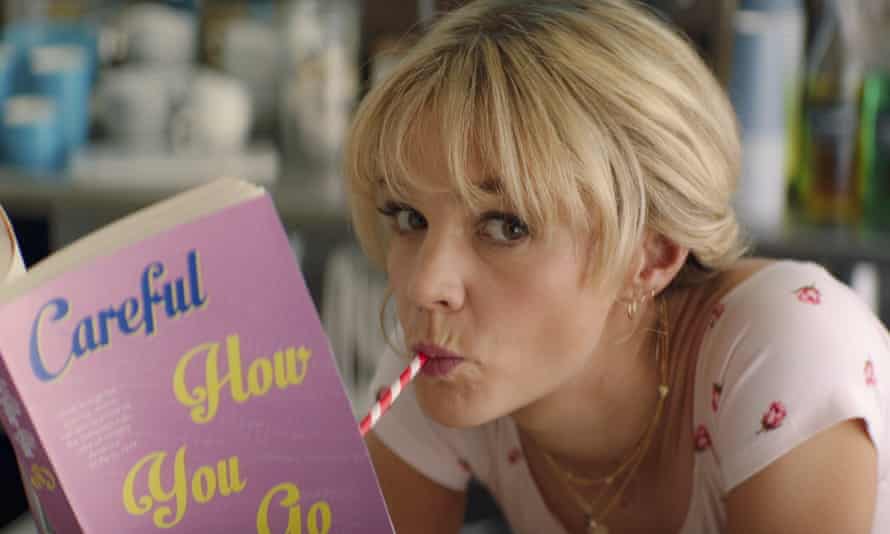
Guts. I love it to see a filmmaker not just with a voice, but also the courage to take bold risks and choices with their characters and stories. Emerald Fennell does exactly this in my highest-rated directorial debut of 2020. The film follows Cassandra Thomas, a coffee barista who uses her night to traumatize any man that attempts to take advantage of her when she pretends to be drunk. While this is just the premise, I do not intend to hint at the film’s plot, as it rewards viewers who come into the film without any preconceived notions about it. The sweet-color-coated production design and cinematography of the film invites viewers to frame the story with a certain innocent artifice. However, as the full story of Cassandra’s life begins to unfold, I was completely swept into a twisted story about rage and the complications of acting upon it.
This is perhaps the most controversial film on this list. The ending of the story has left many viewers rightfully digging for its exact meaning for Cassandra’s character and the thematic message of the film itself. But these are the types of films that I adore, films that invite discussion and contemplation long after leaving the theater (or in this case, closing the browser tab). Additionally, though this film’s tone has been labeled a bit inconsistent, this is a personal flaw that I am forgiving of in films (see Da 5 Bloods). Overall, Promising Young Women is a singular, unique take on the thriller genre that gets me excited to see Emerald Fennell’s next directorial efforts.
You can read Joe Lollo’s full review of Promising Young Woman here.
8. First Cow (Kelly Reichardt, 2020)

Maybe the real capitalism is the friends we made along the way.
I admittedly almost missed the release of this film. Its March 6, 2020 release date could not have come at a more inopportune time. I thought that the release was pulled at the very last minute, and for months, I assumed the release would be postponed to later in 2020 or 2021. Thankfully I watched this gem on PVOD and was gladly reminded how much of a freakin’ genius Kelly Reichardt is.
Set in 1820s Oregon, the film follows the joint venture of Cookie and King-Lu as they attempt to find financial success in the West. However, as the title suggests, much of their success will rely upon…a cow. As with many of Reichardt’s films, this is a patient film. Many would say slow, but I would say that I can stare at any 30-second shot that Kelly Reichardt puts in front of my face. The framing and editing of this film are so precise that nothing feels misplaced. The story, on its surface, has a heartwarming friendship that gives way to the anger one can have at the capitalist system this country is built upon. Watch it if not for its beautiful food.
7. Small Axe: Red, White, and Blue (Steve McQueen, 2020)
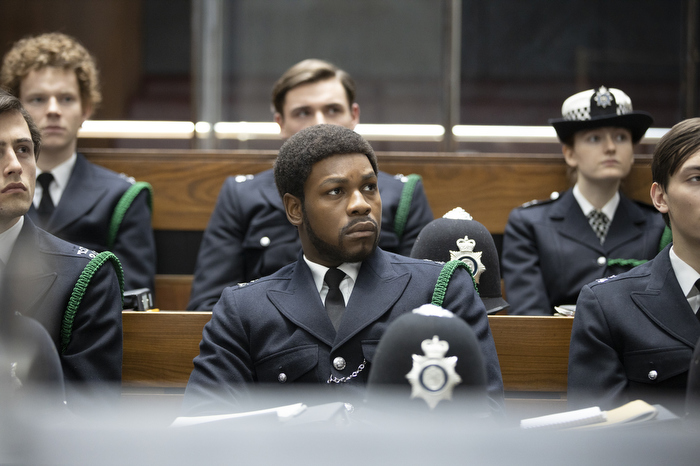
If you belong to two cultures, do you belong to any? It is a question that is timeless, yet has so much room still left to explore on the screen. In this installment, Steve McQueen follows the real-life story of Leroy Logan, a Black man seeking to join the police effort in order to make meaningful change to its racist practices and attitudes. With John Boyega’s amazing performance, Leroy’s optimism is slowly stripped away by the realization that his goals are not enough on their own. Every bang of the locker, every failure despite his best effort feels tragic and upsetting in all the right ways.
In perhaps my favorite ending scene of 2020, Leroy has an exchange with his father that is quiet in nature, but almost dream-like in execution in meaning. It’s a touching exchange that leaves the audience fulfilled and clear on the powerful message on social change that McQueen wants to convey throughout the trilogy.
6. I’m Thinking of Ending Things (Charlie Kaufman, 2020)

By far, I’m Thinking of Ending Things is the most divisive film on this list. Charlie Kaufman’s first live-action directorial effort since 2008’s Synecdoche, New York follows an unnamed woman as she goes on a trip with her boyfriend Jake to visit his parents. It is not hard to argue that the third act is a trippy and confusing turn in the narrative. The events become increasingly more abstract as Kaufman builds upon the puzzle and narrative of the Iain Reid novel this is based upon.
Because I read the book before watching the film, I found much more joy in it than, for instance, my brother, who did not read the book. Kaufman sticks quite faithfully to that material but does so through his own lens. Many of the references to art and performances, such as the musical Oklahoma or Pauline Kael’s criticism of A Woman Under the Influence, are a nod to Kaufman’s personal connection to the characters in the film. As with all of his previous scripts and films, this touches deeply upon themes of regret, mortality, existence, and love. It is worth it for the hours of contemplation that will inevitably follow.
You can read Piper Coyner’s full review of I’m Thinking of Ending Things here.
5. Soul (Pete Doctor, 2020)
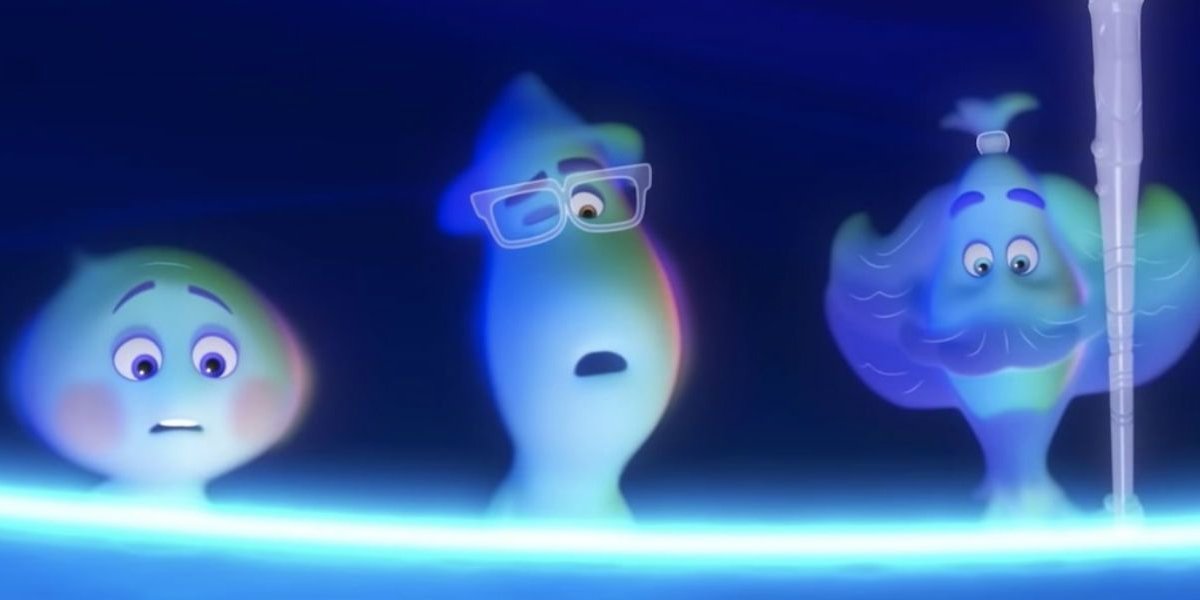
Pixar: the company that created the first movie I ever watched in a theater, Finding Nemo. As with that film and many others following it, the studio has a keen ability to reach into the hearts of audience members and squeeze it until tears begin to leak out of their eyes. This has certainly been my experience with many of their films thus far. But Soul does not have this goal in mind. Or indeed, it may not have the goal to be a “kids” film at all. The deep existential questions that the film tackles do not necessarily speak to young children. It’s what I respect about Pixar; unlike other animation studios, they treat children like they are smart. While children don’t appreciate the final message yet, I have a feeling this will become a classic in the many years to come.
4. Nomadland (Chloé Zhao, 2020)

The frontrunner for the Oscar deserves every single ounce of praise. Along with the following three films in this list, Nomadland is the cream of the crop in terms of what I saw in 2020. Chloé Zhao continues to prove herself as one of the most unique voices of her generation. She is able to take the transcendental style of filmmakers like Terrence Malick and infuse it with a grounded, realistic plot that captures the almost-free, yet tough spirit of living in the American West. Frances McDormand knocks it out of the park (duh.) and the way she is able to work with the many non-actors of the film is simply magnificent.
Perhaps the best compliment I could give the film is this: there is no script. Every moment feels as if I am dropping into a random moment in every character’s life. By the end of the film, when Fern (McDormand’s character) comes to her ultimate emotional climax, it made me so happy to watch the film.
3. Never Rarely Sometimes Always (Eliza Hittman, 2020)
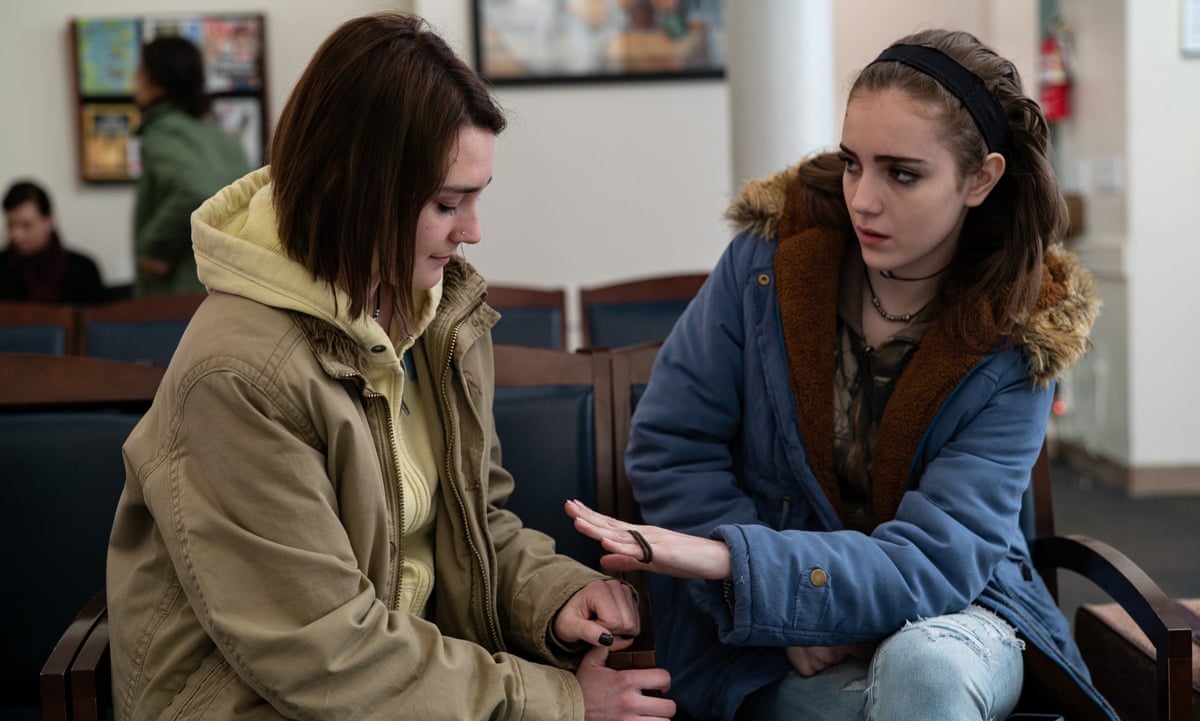
This was my hardest watch. Eliza Hittman’s immaculate writing makes every moment of Never Rarely Sometimes Always uncomfortable to watch, no matter who is watching it. As I watched this film in my living room, partway through, my roommate came from his room to grab a drink. After a moment of watching an instance of sexual harassment that the main protagonist, Autumn, experiences, he immediately noted how disgusted and angry he felt. The film follows Autumn as she attempts to get an abortion and Hittman quietly follows the hardships of this process. The sacrifices she and her cousin, Skylar, make along the journey are just hard to watch. But the minimalist style, combined with the subtle performances, create a very honest and warm relationship at the core of this film allowed me to access and absorb the beauty and hardships this film had to offer.
2. Dick Johnson is Dead (Kristen Johnson, 2020)

I am one to avoid documentaries. I’ve seen too many of those which simply follow an expert-footage-expert formula that comes to be the backbone for many school videos. Dick Johnson is Dead absolutely does not do this. The film follows its director, Kirsten Johnson, trying to find a way to memorialize her father after he is diagnosed with Alzheimer’s disease. Through fantastical recreations of what-if death scenarios and clips of moments that were not “on camera,” Johnson may have created a document that goes beyond just a way to remember her father. It is an exploration of finding joy in the face of the inevitable great beyond. As I grow old, so do my grandparents. They have slowly accepted their aging, but I find it hard to follow in their footsteps. This film reminds me there is joy in celebrating their lives. Even if I felt 1/100th of the catharsis Kirsten Johnson did, then it makes, at the very least, #2 on my ranking.
1. Minari (Lee Isaac Chung, 2020)
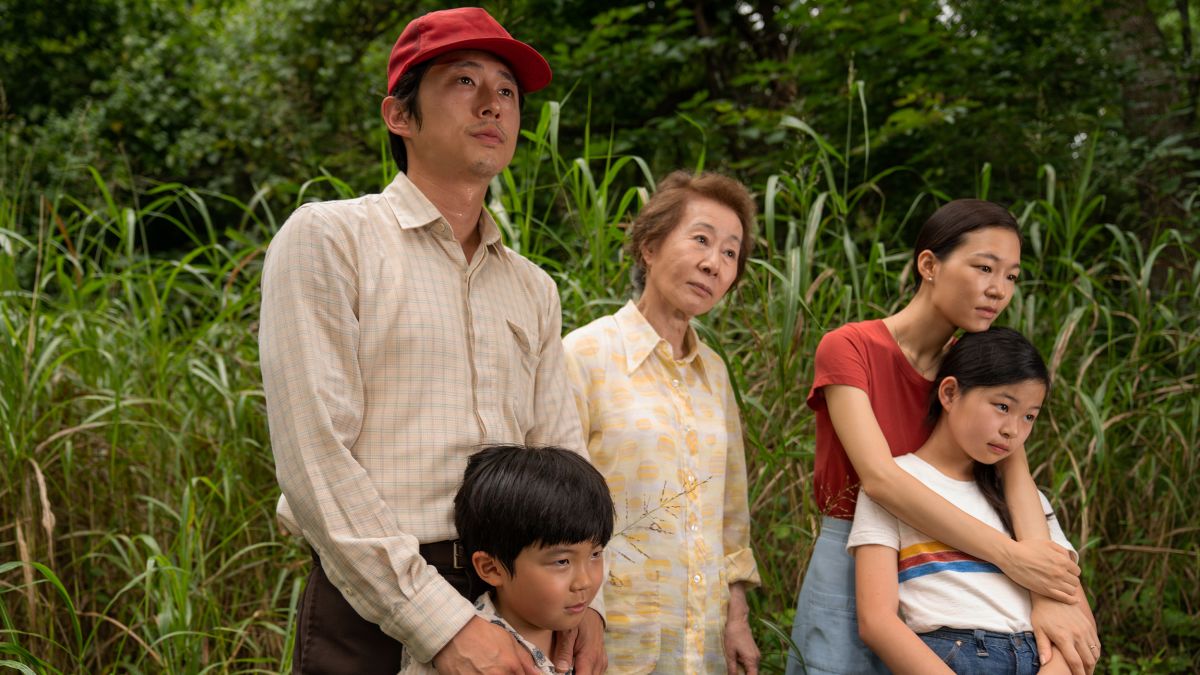
Yes. Yes, yes, yes, yes. This film is the best of the year. I heard the hype following the Sundance 2020 Film Festival but did not really have high expectations going into this film. In its 115 minute runtime was one of the closest reflections of my family that I have ever seen on a screen. There are many differences: I am Indian, I live in Washington, and I am not the son of a farmer. But I nonetheless have seen my parents put everything into their work to build something for me and my brother. I have seen the generational gaps between me, my parents, and my grandparents create conflict. Despite this, we love each other. I saw this all encompassed between one of the film’s final interactions between the young son, David, and his grandmother on the road. I rarely cry when watching movies. This made me cry.
In listening to an interview from the film’s director, Lee Isaac-Chung, I am heartbroken to hear that he almost gave up on the idea that he could make it as a feature-film director before Minari. By the second watch, I knew that this film would be placed on my all-time favorites list. To know we were very close to missing this voice and this story…it’s unbelievable. Stay for every moment of this film, especially the luscious cinematography of the Arkansas wilderness, the performances from the family members, and the score from the highly-underrated Emile Mosseri. If not that, watch it to support representation. So that Asian-Americans such as myself can see themselves on screen. So that we know our stories matter and that we are not alone.
